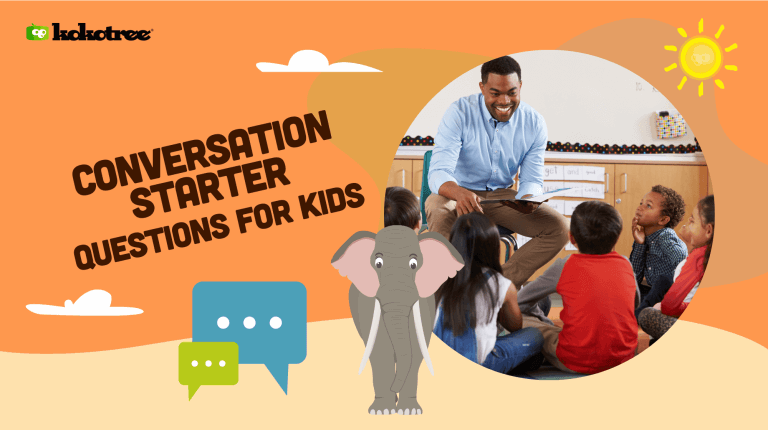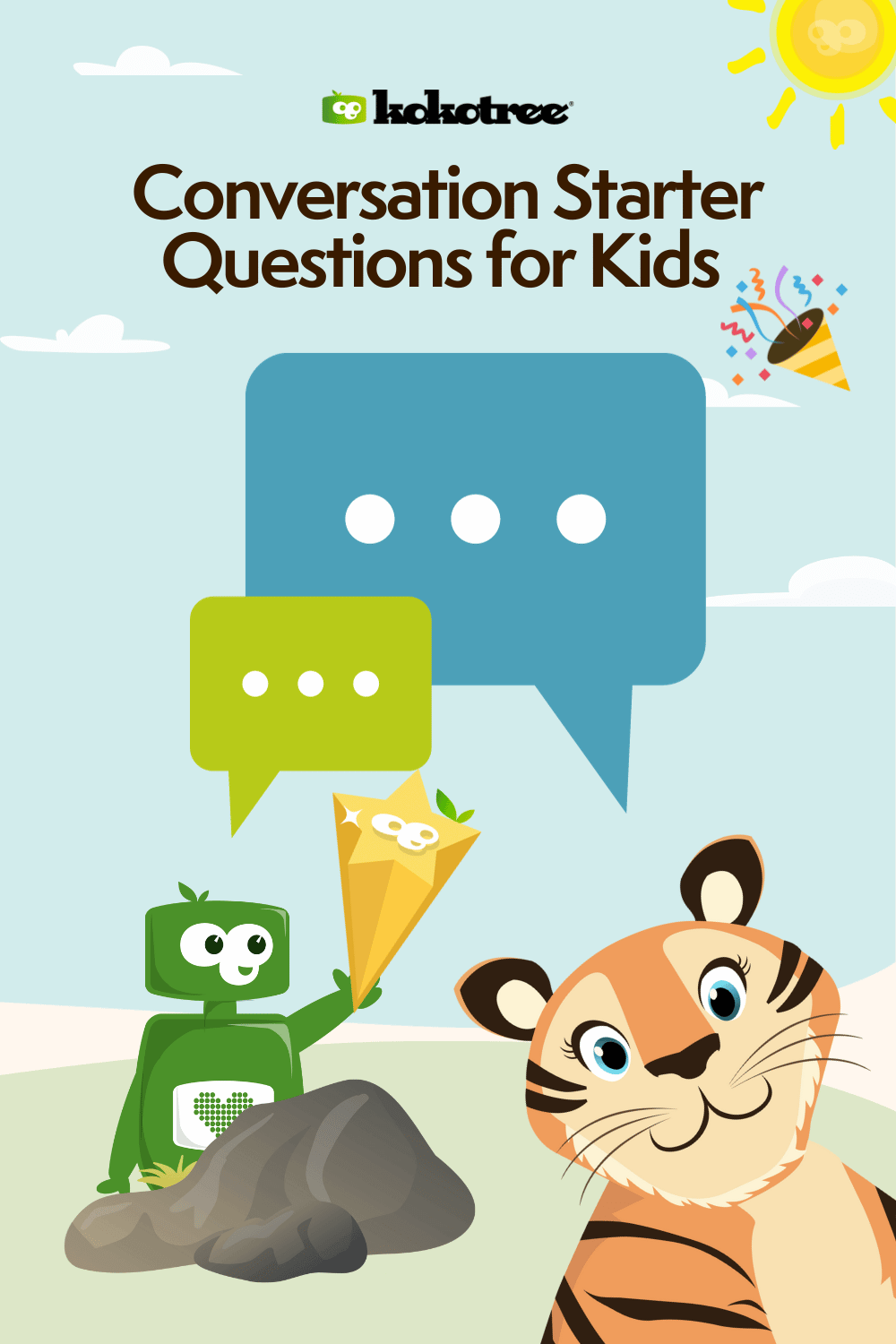

Written by: Kokotree
Updated:

Embark on a journey of imagination and wonder! For all the parents, guardians, and educators out there, we proudly bring 401 conversation starters tailored for your curious little ones.
From whimsical fantasies to real-world wonders, this collection is designed to ignite stimulating discussions, evoke thoughtful answers, and strengthen bonds. Dive in and discover what your child has to share!
For ages 2-6. They watch and play for 20 minutes. You get a break.
⭐ 5,000+ parents get daily breaks with Kokotree.
Try it Free →Works in 30 seconds • No credit card • Cancel anytime
Conversation starters for kids are prompts or questions crafted to engage children in meaningful discussions. They touch on various themes – from their dreams and feelings to their observations about the world. These conversation starters aim to open up channels of communication, allowing children to express themselves freely.
Explore a variety of engaging activities and questions for kids.
Engaging in meaningful conversation provides an array of advantages for young minds:

🌟 Expand Your Conversations with More Engaging Content! 🌟
Engage and educate with a variety of interactive questions perfect for young, curious minds:
🔹 True or False Questions for Kids
Dive into a fun mix of facts and myths, perfect for budding detectives!
🔹 Would You Rather Questions
Fun and whimsical dilemmas crafted especially for preschoolers. What will they choose?
🔹 Trivia Questions for Kids
Expand their horizons with a plethora of interesting and thought-provoking trivia!
🔹 This or That Questions for Kids
Fuel their imagination and decision-making skills with playful scenarios!
Don’t miss these exciting opportunities to connect and learn with your child!
For ages 2-6. They watch and play for 20 minutes. You get a break.
⭐ 5,000+ parents get daily breaks with Kokotree.
Try it Free →Works in 30 seconds • No credit card • Cancel anytime
Curious about integrating these prompts into your child’s daily routine? Conversation starters can be both fun and enlightening. Here’s how to weave them seamlessly:
Using conversation starters is more than just asking questions. It’s about creating a supportive environment for open dialogue. Here’s how to make each conversation memorable:
Navigating the world of toddler communication can be a delightful voyage of discovery. Unlike older children, toddlers often communicate in simpler terms, with their world revolving around basic experiences, immediate surroundings, and innocent wonders. The ideal conversation starters for toddlers are those who tap into their daily experiences, vivid imaginations, and boundless curiosity.
Using these conversation starters will enhance your bond with the toddler and promote their language development and understanding of the world around them.
The preschool years are an exciting time of rapid development and exploration. As children transition from toddlers to preschoolers, their capacity for language, understanding of the world, and social interactions grow immensely. Thus, conversation starters for preschoolers should cater to their newfound ability to recount experiences, express opinions, and dive into their blossoming imaginations.
These conversation starters help you connect deeper with your preschooler and play a significant role in their overall development and confidence building.
As children step into Kindergarten, they find themselves at the gateway to formal schooling and a broader world of social and academic interactions. Their understanding of themselves and their environment becomes more nuanced, and they start forming more complex thoughts. For Kindergarteners, the perfect conversation starters should encompass their daily adventures in school, budding friendships, and ever-growing curiosities while giving a gentle nudge toward critical thinking and self-reflection.
Diving into these conversations with your Kindergartener enriches their comprehension of their experiences and fosters a nurturing environment for them to share and grow.
As children transition into the world of 1st grade, their horizons begin to broaden even further. They start encountering more structured academic challenges, deeper social interactions, and a greater sense of independence. Their inquisitiveness is paired with a growing vocabulary and a keen desire to share their insights and experiences. Conversation starters for 1st graders should resonate with their evolving world view, piquing their interests, and allowing them to articulate their observations, feelings, and aspirations.
Engaging with 1st graders through these conversation starters will not only deepen your understanding of their daily lives but also bolster their communication skills and critical thinking abilities.
By the time children reach 2nd grade, they’re fully immersed in the academic environment and are beginning to cultivate a deeper understanding of the world around them. Their conversations often straddle the line between childlike wonder and a budding maturity, reflecting their growth both in school and at home. Appropriate conversation starters for 2nd graders should embrace their evolving cognition, fostering discussions that allow them to showcase their knowledge, express their feelings, and dive into their ever-active imaginations.
Exploring these conversations with 2nd graders can be an enlightening experience. Not only does it offer insights into their growing minds and perspectives, but it also fosters an environment of trust, understanding, and mutual respect.
By the time children reach 3rd grade, they’re navigating a critical juncture in their academic and social lives. They’re becoming more articulate, forming stronger opinions, and building on their foundational knowledge. Their world expands beyond the confines of home and school, with many engaging in extracurricular activities and more complex social dynamics. Appropriate conversation starters for 3rd graders should celebrate and challenge their maturing minds, encompassing their academic adventures, personal reflections, and expanding worldview.
Exploring these conversation starters with 3rd graders can unveil their insights, aspirations, and reflections, allowing caregivers and educators a deeper understanding of their developmental milestones.
As children venture into the realm of 4th grade, their perspectives undergo a noteworthy expansion. They are not just older but often wiser, more observant, and more analytical. Their academic topics become more sophisticated, and they start to form deeper connections with the material they learn. Their social sphere also undergoes evolution, as they encounter a more intricate web of relationships and dynamics. Conversation starters for 4th graders should reflect this multifaceted growth, challenging them to express their opinions, share their experiences, and articulate their increasingly complex thoughts.
Engaging with 4th graders using these conversation starters can be an insightful journey, offering a window into their evolving minds, beliefs, and experiences. It not only facilitates bonding but also fosters an environment of trust and mutual respect.
As children transition into 5th grade, they’re often on the brink of adolescence, a period teeming with growth, discovery, and transformation. This age witnesses a blend of increasing cognitive capabilities and deepening emotional awareness. Their interactions, experiences, and academic exposures become more nuanced, and they often grapple with a mix of childhood innocence and burgeoning maturity. For 5th graders, the perfect conversation starters should tap into their emerging critical thinking skills, personal and social reflections, and the vast pool of topics they encounter both in and outside of the classroom.
Engaging with 5th graders through these conversation starters allows for a deeper connection and understanding of their dynamic and rapidly evolving worlds, fostering environments of mutual respect, trust, and growth.
As we conclude this captivating voyage of conversation starters, it’s evident that every question is a bridge to the vibrant mind of a young learner. These aren’t just inquiries; they’re pathways to introspection, creativity, and a deeper understanding of the world. Every response from your child unveils layers of their evolving thoughts, granting insights into their blossoming intellect and emotions. So, before we part with the final prompt, pause and savor the rich tapestry of conversations we’ve woven together.
And to cap it off with question #401:



